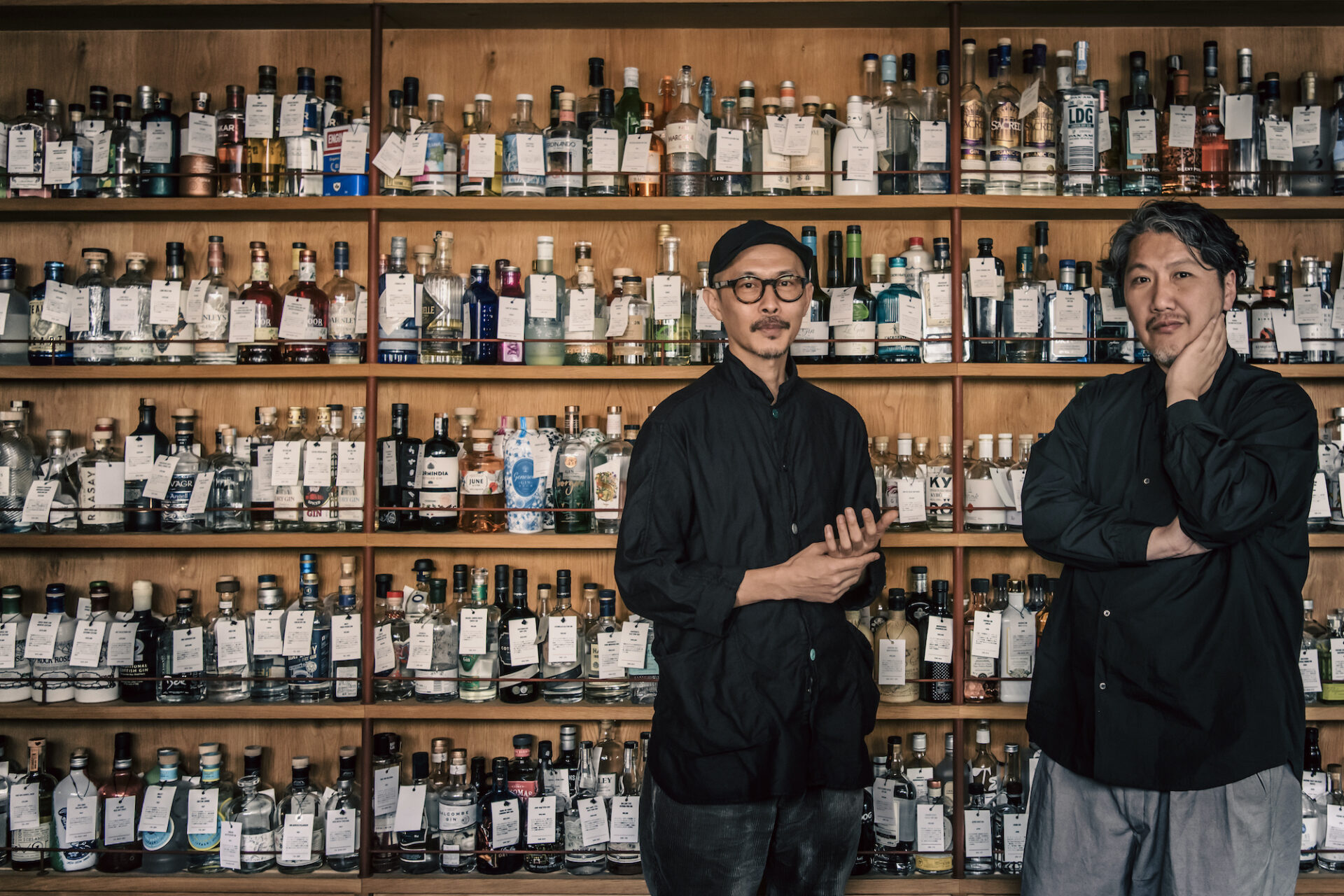
2025-05-01
Vol.16
President of the FLYING CIRCUS Inc. and Organizer of the Gin Festival Tokyo
Takeaki Miura(part 2)
-
Don't listen to needs
-
The Moment When the Quiet Side of Myself Comes Out
-
Feelings Transcend Science
-
Shinto and Islam
The place we visited was a part of a maze-like building located about a 10-minute walk from Shibuya Station. Upon entering the place, we were welcomed by over 1,000 bottles of gin and today’s guest, Takeaki Miura. Known as one of the pioneers of craft gin in Japan, Miura wears many hats, including restaurant owner and distiller. OSAJI brand founder Masakazu Shigeta first met him at the end of 2022 in a craft gin project called “YOHAKHU,” and the two now call each other “best friends.” The two, who share deep interests in music, culture, and scent, and also embody the 90s with fascinating street culture, talked about a wide range of topics, including romantic mindset, Shinto, and Islam.
(Click here for the first half of the interview.)
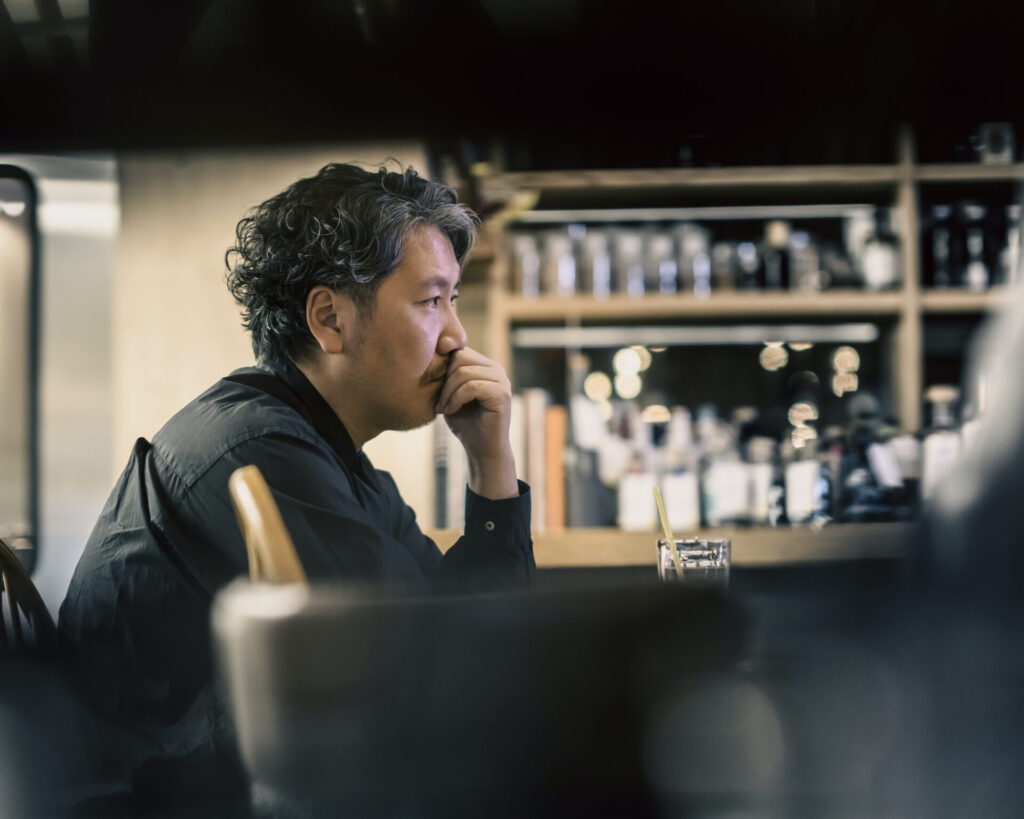
“If you bring a gift that the person already knows or is interested in, it means you have lost.” (Shigeta)
Masakazu Shigeta: There is something that I always tell myself when creating something. That is, “Don’t listen to needs.” Once you start addressing the needs, you end up providing something inevitable. What we essentially need to do is figure out the latent and potential needs. That is also what I have been telling my staff all along.
——How do you find them out?
Shigeta: Well, I really like giving gifts to people, and that is a kind of training to refine my senses. By observing their actions and behavior, I always think about how to provide them with unexpected, shocking experiences. If you bring a gift that the person already knows or is interested in, it means you have lost. It is only when you give something the person didn’t know that you can truly find the joy and meaning of giving a gift.
The reason our company basically does not do marketing research is that it can only uncover needs that are already apparent. First of all, you can see such needs without doing market research. So, we can leave the job of responding to the apparent needs to those who can spend a lot of money on large-scale marketing research. Instead, we want to make things go beyond customers’ imaginations.
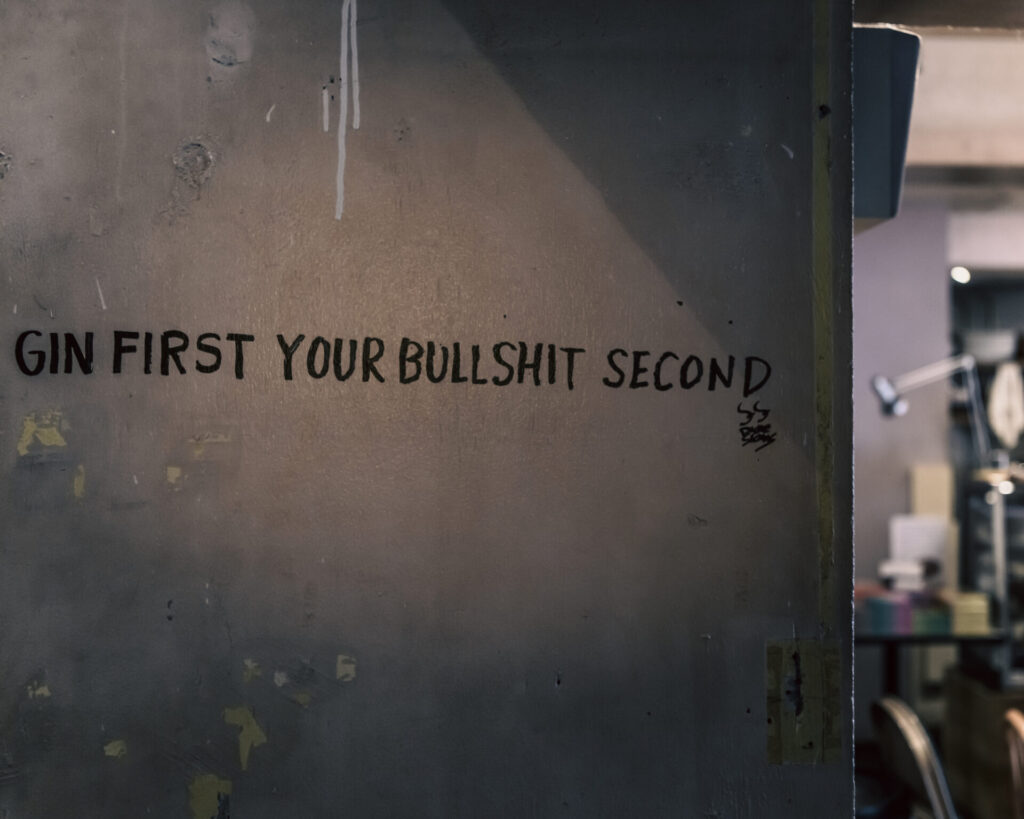
However, some products created that way did not sell at all. I had a hard time being grilled by staff members many times. However, after all, the moments that move you only exist in coincidence. We have to constantly improve ourselves in many aspects, including daily behavior and attitude, to encounter such moments. At this age, you get a strange air of dignity even though you don’t want it. If it makes it difficult for young people to approach me, I think I am facing a crisis. So, my current challenge is how to show that I am open to their approach.
Takeaki Miura: It’s so typical of you. I, on the other hand, only believe in coincidence to an extreme degree. I believe I can achieve fascinating coincidences by simply reducing unnecessary noise. If I find I have had fewer opportunities recently, I always tell myself that I am being misled by information and unable to make decisions that are true to myself. In that sense, my encounter with Mr. Shigeta was more than a simple pleasure; I was more interested in what he would bring to me. I think random encounters always test me.
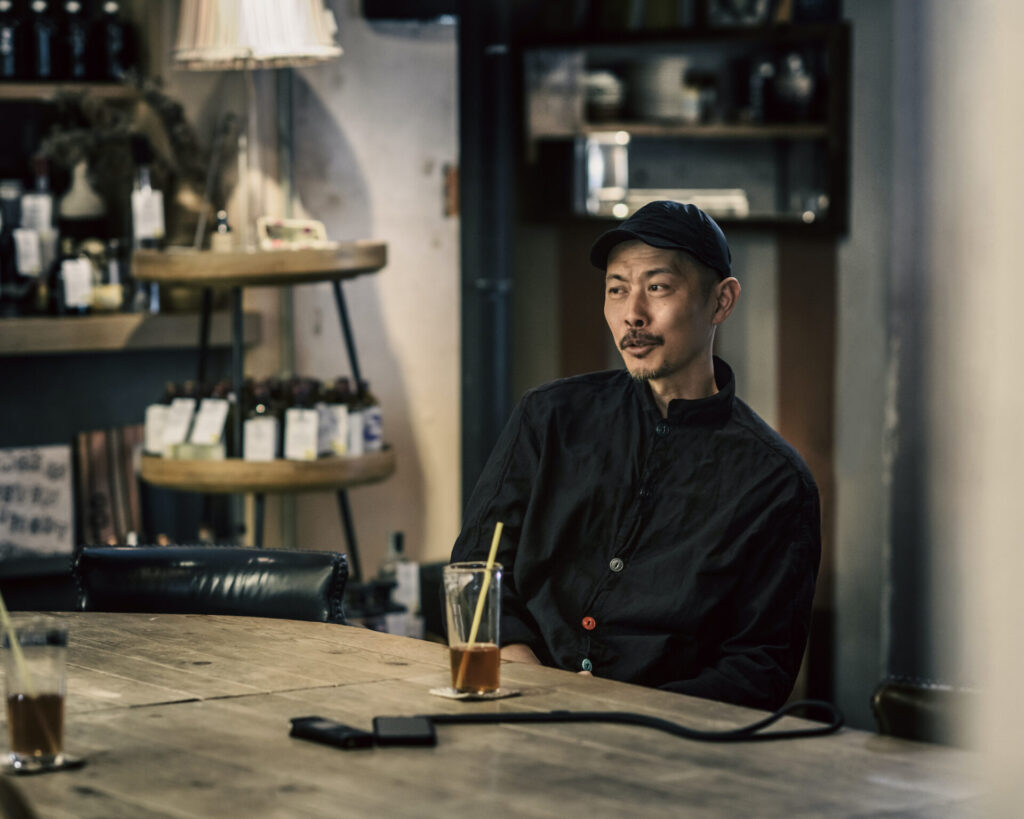
“I feel graffiti reflects someone’s silent scream that they can not put into words.” (Miura)
Miura: I think shops are kind of legal graffiti. Especially our restaurant is like that. You will get in trouble if you graffiti on the public wall, but people accept us if it is a form of restaurant or store, and you can do whatever you want in most cases.
I pass through the Aoyama tunnel every day and have seen the same scene over and over again: graffiti is drawn on the wall and erased. That made me realize that the city eliminates graffiti and stray dogs in the process of economic development. Having fewer stray dogs around us is certainly better, but I feel graffiti reflects someone’s silent scream that they can not put into words. Just when I was wondering what would happen if it continuously disappeared from the city, somebody graffitied our signboard. But the color scheme and the design were quite good, so I thought, “OK, not bad!” (laughs) I keep the graffiti as it is.
——Are you still working on-site at the restaurant every day?
Miura: I have been involved in serving customers since I started working at the cafe. I think it suits me because I am talkative. Although I still work on-site occasionally, I stopped regularly working on-site ten years ago. However, I started feeling extremely stressed out as soon as I stopped it. The reason was that the amount of time to speak dropped dramatically. I realized for the first time then that my way of customer service was not listening to them but talking about myself, and I felt ashamed.
One day, I was not feeling well, but the number of staff was not enough, so I had to go out to work on-site. I was clearly less energetic and talked less. I was worried about how the customers felt, but then two groups of customers told me, “Take-san, you have a good vibe today.” After all, I guess I usually talked too much. (laughs)
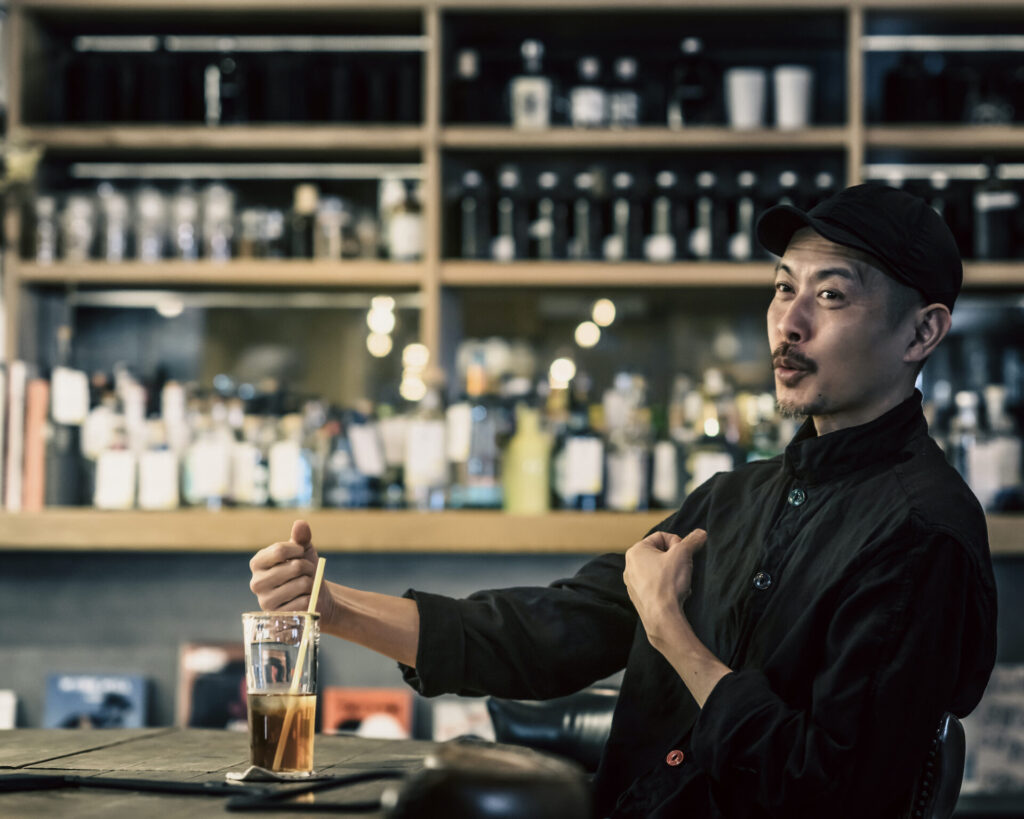
——I assume you must have been forced to close your restaurant for a long time during the COVID-19 period. Wasn’t it stressful to lose interaction with customers and the time to talk with them?
Miura: The answer is yes and no. At the time, I was launching my distillery, and a quiet side of Takeaki Miura, which was very different from the sociable and talkative person I usually am, came out. The absence of talking does not stress me out when playing the guitar or conversing with myself. To start working on the distillery project, I had my quiet side come out for the first time in a while.
Now, I have more motivation to focus seriously on manufacturing than making a place, which I have been doing in the course of running a restaurant. When I am in that mode, I tend to be quiet. Mr. Shigeta, I think you also like to talk, but are there any times when you are quiet?
Shigeta: I am quiet when I talk with Take-san because Take-san talks a lot. (laughs) Other than that, I am quiet when I cook, write, and blend scents.
Actually, I have also been thinking more and more these days that I will step away from management one day and dedicate myself to creating something. However, it is not that I want to do that at any cost. Rather, I want to know what my style would be like with what remains after I remove the management aspect from my life. I am filled with excitement and expectations for that.
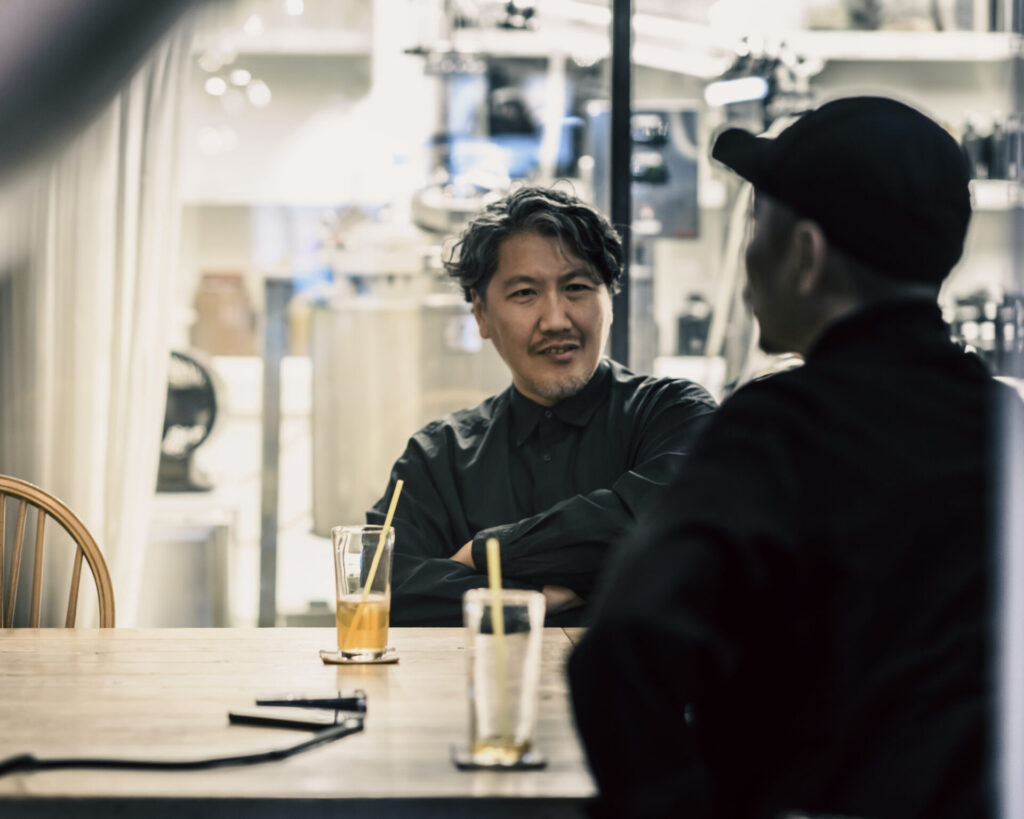
——Is it difficult to get excited by the management as a job?
Shigeta: Rather than enjoying management itself, I think it is more fun to create something like a playground through management. The same goes for companies and brands. I want to create a place where people gather and enjoy, like a park where people can spend time. Of course, how to play there is important, though. I feel the same atmosphere in your restaurant.
——I think the atmosphere of the Gin Festival in Tokyo is very similar to what Mr. Shigeta said.
Miura: The manufacturers of the bottles we serve are all unique and have rich personalities. Then, I thought it would be more fun for customers to meet them in person rather than talking about them in the restaurant. That is why I started the Gin Festival Tokyo. Inspired by the encounters at the festival, I want them to foster friendships and develop a new culture. This is a way to cultivate friendship and culture. Of course, I also want to join and enjoy it. In this sense, I think somewhere in my heart, I had the desire to create a playground.
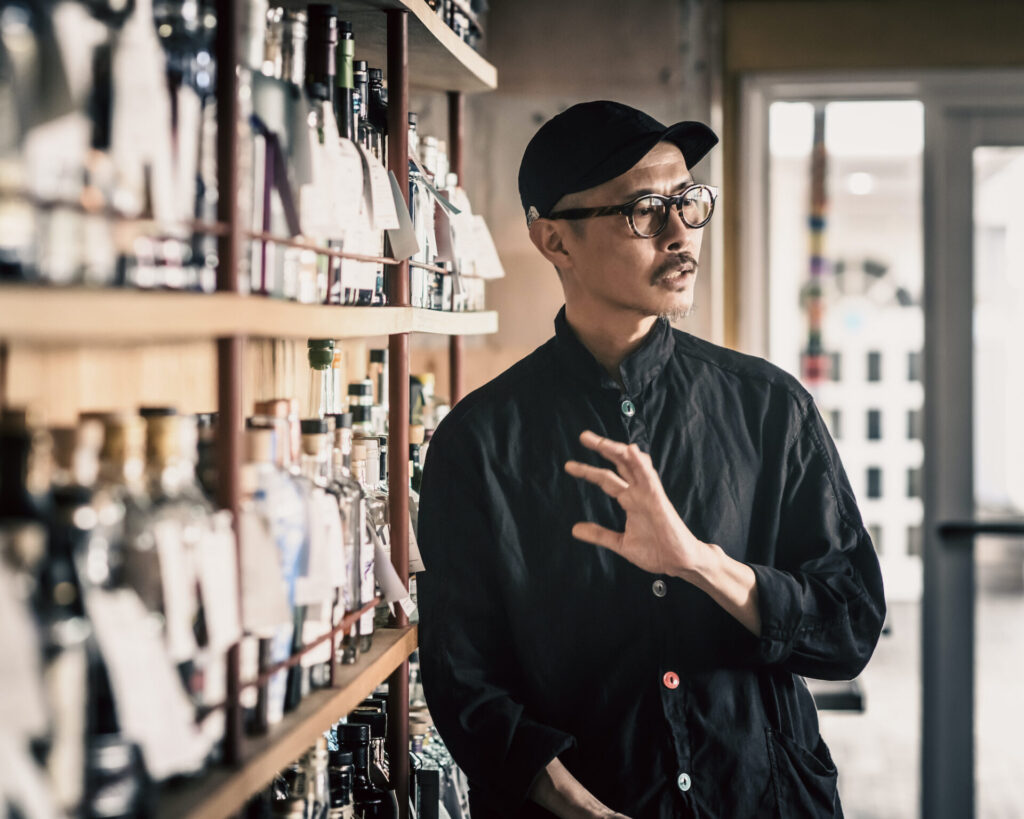
“I want to carefully condense the trivial events of everyday life and convey them to people.” (Miura)
Miura: Today, I have realized once again that Mr. Shigeta is the person who is not satisfied with the status quo and has a stronger desire than most people for “We can do more.” Where does that emotion and energy come from?
Shigeta: I am just hungry. I believe there must be greater and greater pleasures. People around me may think I do things to make people happy, but in reality, it is for my own satisfaction. But I believe that something I have done for my own satisfaction will eventually make someone happy. That makes me feel good, and that is also the reason I can keep going. I often think about how interesting it would be to bring this person and that person together, but I think it is also motivated by such selfish feelings.
The desire to see new scenery that I have never seen before is similar to the feeling you get when you travel abroad. Everyone has had the experience of visiting a country that has given them life-changing insights. I had this experience last year when I went to Europe for the first time at the age of 45.
Miura: I didn’t know that you had never been to Europe.
Shigeta: Up until then, I had been obsessed with Asian countries and frequently visited there, but I could not really get interested in Europe. However, when I visited Milan, I found Europe interesting. I could feel the traces of a long history everywhere in the city. I was amazed, and my outlook on life changed. At the same time, I felt a surge of desire to see more different landscapes.

——Mr. Miura, I imagine you feel both the global and local movements and trends through the gin.
Miura: TOKYO FAMILY RESTAURANT is based on the concept of getting to know the world through food. But when I started the restaurant, I strongly believed in the idea of “Think globally, act locally.” But the gin has an opposite view, which is “Think locally, act globally.” It is like we connect to the world through the gin.
For me, the project of the restaurant and the gin is something like a duology. I think by working on both, my idea will finally come to fruition. In the past, people used to say that I could not go further without expanding the business or that it was better to keep it small if I wanted to move quickly. But as times have changed, you can communicate your thoughts far away, even if the scale is small. Now, I have a growing desire to carefully condense the trivial events of everyday life and convey them to people. I think a small business scale is more suitable for this goal.
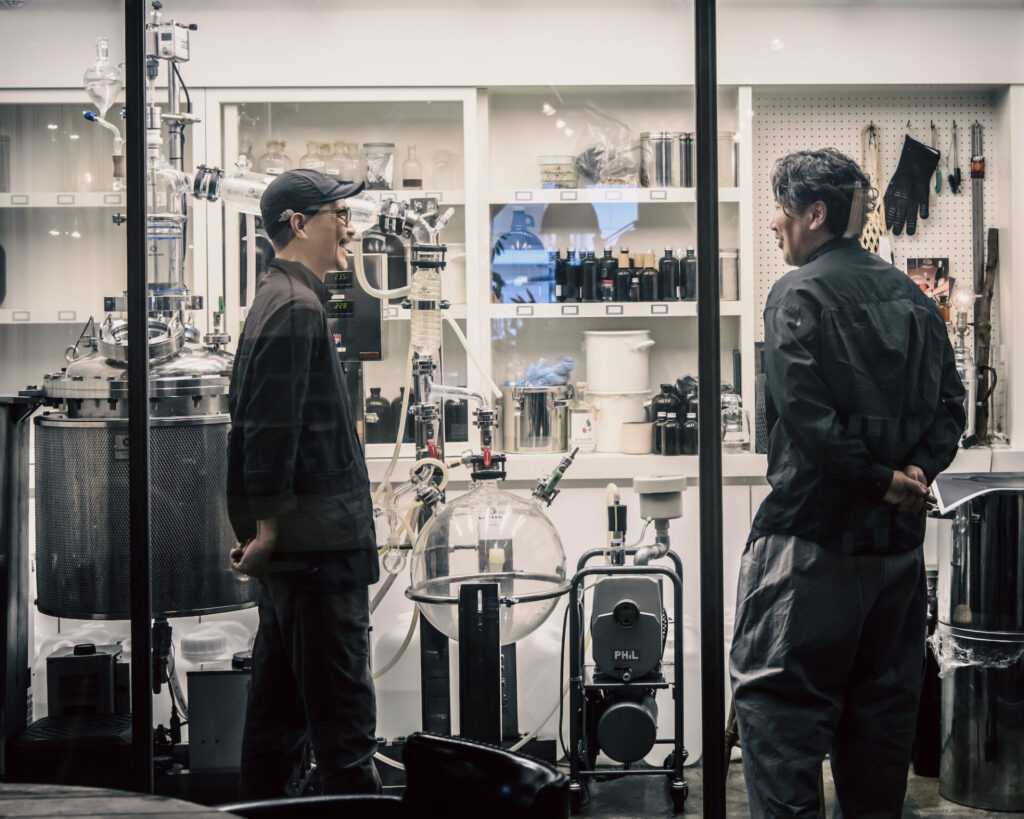
Shigeta: In the dialogue before the last one, we had Dr. Toshiro Inaba, a medical doctor and the art director of the Yamagata Biennale, as the guest, and the topics of “unscience” and “proto-science” came up during the dialogue. He avoids using the term “unscience” and uses “proto-science” instead. He explained that “un-” has a negative connotation that doesn’t lead to anything. I found his attitude very romantic.
Many people dismiss things that they can not feel or see as unnecessary or worthless. However, there is a moment when your heart is moved by things you can not see or feel. While it is difficult to explain logically, “proto-science” might cover such things. The reason I often run into Take-san in the city is also something “proto-scientific.”
Miura: Among what we can recognize and feel, I feel that only a few tenths of the percentage of them we can convert into concrete words. Some people might find my idea nonsense, but for me, feeling is more reliable than science. At the age of 50, I feel more convinced of it than ever. However, I am not saying that I deny science; it is more like how we interpret the idea of “proto-science.” I had never known the term “proto-science,” but I feel everyone has latent sensitivity for such things.
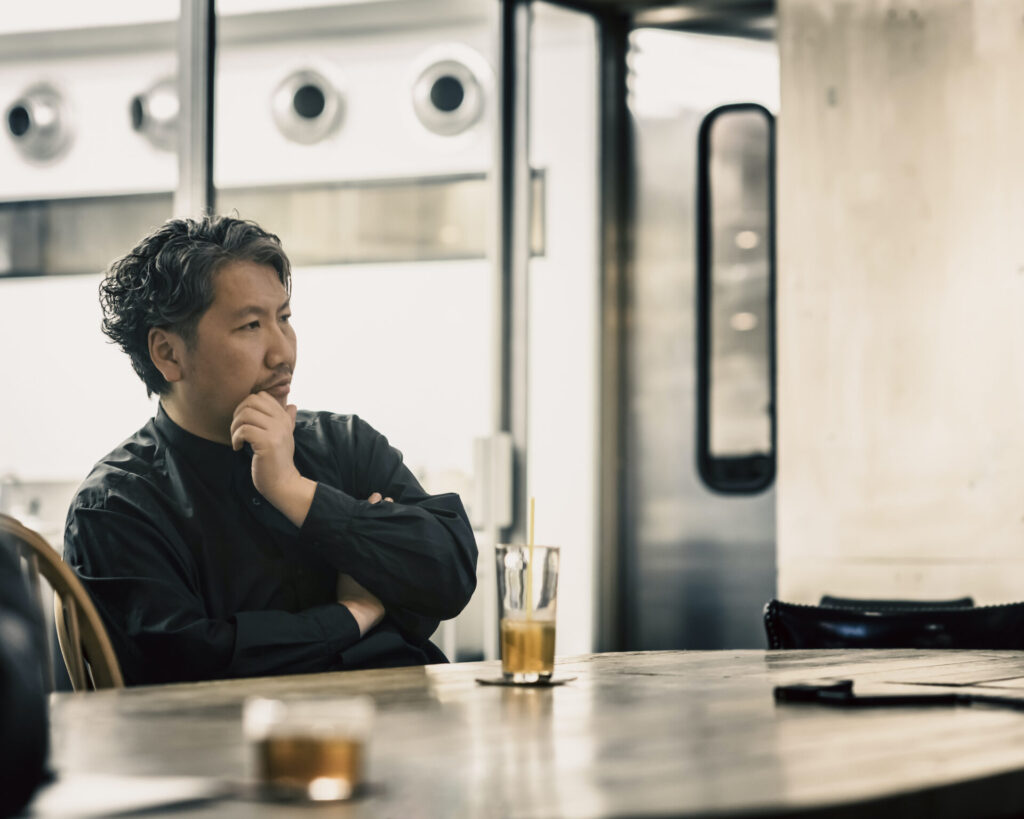
“The idea of understanding natural phenomena in the context of divine existence is deeply rooted in every aspect of people’s thoughts in this country.” (Shigeta)
Shigeta: In Japanese, we have the expression “Itadakimasu,” which means “I humbly receive.” It is said that only the Japanese people have the sense of showing gratitude for receiving life before eating a meal. This reflects the belief that everything has its own divinity and life, and we live by sharing it. I think the idea itself is that of “proto-science.” Although people in this country are basically non-religious, the idea of understanding natural phenomena in the context of divine existence is deeply rooted in every aspect of their thoughts. However, while Japan is attracting international attention, I think the Japanese are becoming less aware of their own value.
Miura: The idea of understanding natural power in the context of divine existence has to do with Shinto, which I find very interesting as a religion uniquely developed in Japan. Although Shinto is characterized by the absence of the founder, religious leader, and scriptures, it has continued to exert influence on people’s lives in Japan. I think the absence of a founder and scriptures is the ultimate wisdom because nobody can take it away from people.
The other day, I watched a TV program on NHK about how Japanese manga is widely accepted in the world. What I felt was that manga is now functioning as a source of emotional support for people across the world. I think Shinto values are secretly embedded in manga, and people around the world are relieved by it. Watching the program, I felt it would be impressive if Shinto values or the worldview of “Itadakimasu,” which are cherished in Japanese culture, were gradually spreading to the world.
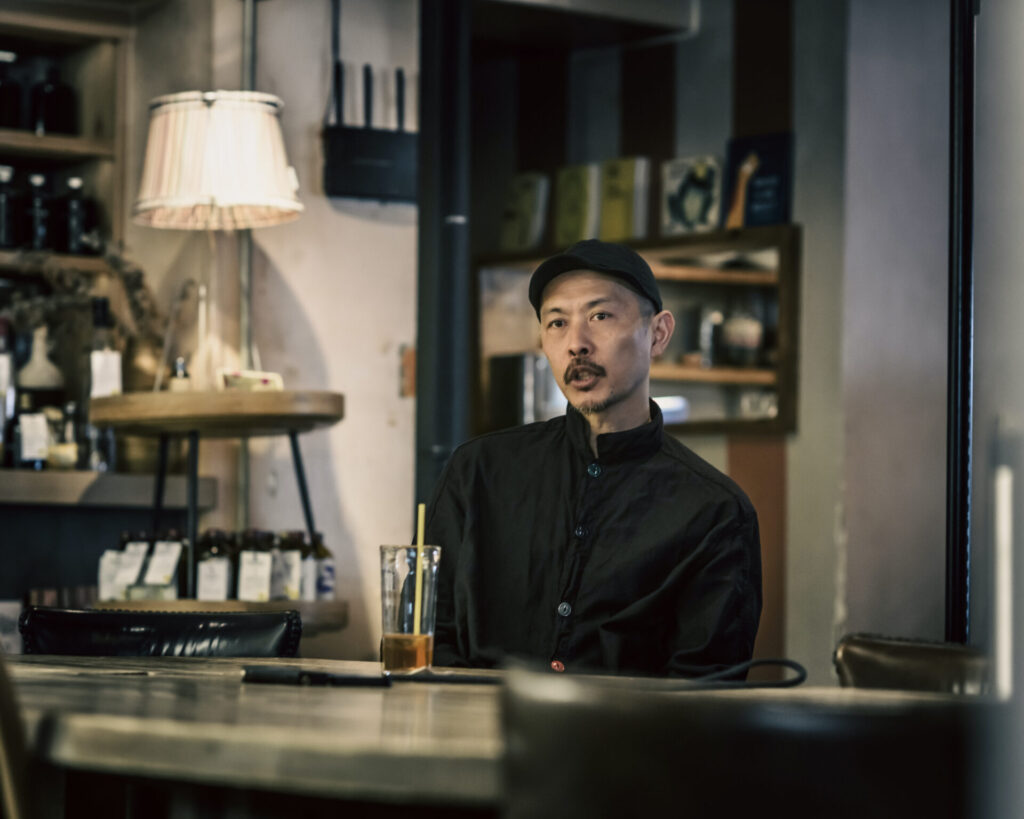
Shigeta: Finally, there is one thing I wanted to ask you today. Why did you name your original gin “orientalia”? I want to know the reason behind that.
Miura: It is going to be a bit of a long story. During the Age of Exploration, spices were brought to England and the Netherlands by the East India Company. The enticing scent was indispensable for the birth of gin. The culture of scent was introduced to Japan through Buddhism, and it has developed into its unique form known as “Kodo,” or “way of the fragrance.” The breathtaking Silk Road and the journey to Japan, located at the eastern end of the Eurasian continent, is my gin-making theme.
I came up with the name “orientalia” halfway through the process, inspired by the book Orientalism by Edward Said, a Palestinian-American scholar, which I read as a teenager to learn about Islamic history. I learned things like the premise of understanding others and different cultures, and the idea that Islamic history had been interpreted from Western perspectives and at their convenience, and it had a profound impact on my life and values.
I thought I would simply name it “Orientalism,” but I changed my mind inspired by the “Tropicália movement,” the Brazilian art movement advocated by artists like my beloved Caetano Veloso in the 60s. So, I decided to name it with the meaning of the Orientalia movement, which redefines the beautiful Asian tradition and values through culture and art.
I want to share my worldview with people around the world while viewing Japan and Asia as my local area.
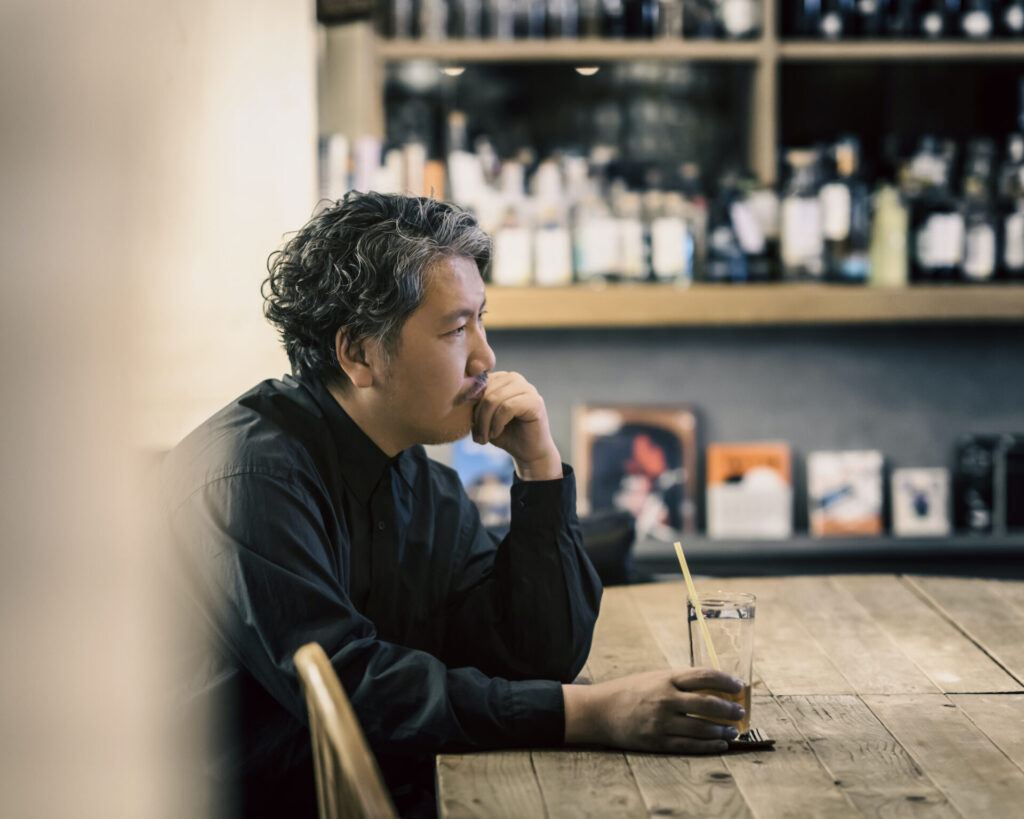
——So, it was made with your thoughts on the scent culture of Asia in your mind.
Miura: Actually, there is more to this story. My father passed away at the beginning of this year. I attended the funeral as the chief mourner and brought a bottle of orientalia to pour into the coffin. Then, one of my elderly relatives sitting beside me saw the bottle and asked me where the name came from. According to my mother, he is the leading expert on Islamic studies in Japan. I told him the background, and then he asked, “Did you read the book?” I wondered why he was asking it, but it turned out that the last book he was involved in planning at a publishing house, where he worked before becoming a researcher, was the book Orientalism. We can find a name in the afterword. Similar to today’s story, there was a series of coincidences. I really wanted to tell the story to my father, but I could only know it because my father passed away, so I think it was a final coincidence he brought to me.
When I was moved by the Islamic culture in my teens, I never imagined that it would lead to this story. However, sometimes, this sort of coincidental encounter brings something significant, and I always look forward to seeing where they will take me and what kind of scenery they will make me see. Although I now have various responsibilities in business and family, I always prioritize what moves my heart above others, and I don’t think it will ever change.
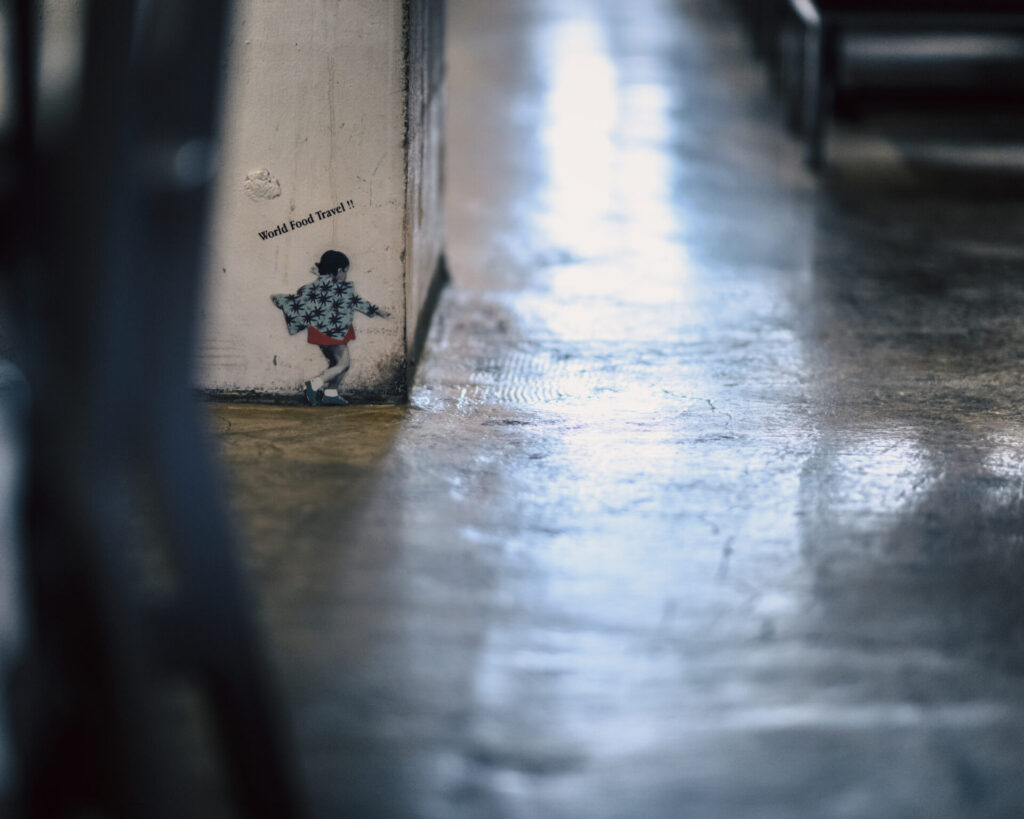
——The atmosphere of restaurants comprises a combination of various elements, such as the food, customer service, and staff members. I guess the ideas and actions of an owner alone can not create it. How do you share your ideas with your staff?
Miura: I don’t do anything intentionally to get everyone on the same page, or rather, I try not to make a consensus. As a manager, that is probably not a good thing, but I don’t like evaluating or educating people.
People do things when they enjoy them and take action when excited. On the other hand, some people get paralyzed by being obsessed with the idea that “I have to do something” or “I have to take action.” All I can do for the staff is secretly remove the elements that prevent growth. I have no desire for my staff to inherit my DNA. I just want them to be my colleagues with their own ideas, and so my attitude is, “You can just do whatever you want.”
Shigeta: I think I have heard very soulful stories today. Thank you so much for joining us.
Miura: We didn’t have much time to talk even when we met at events lately, so I am happy we have had time to talk at length today.
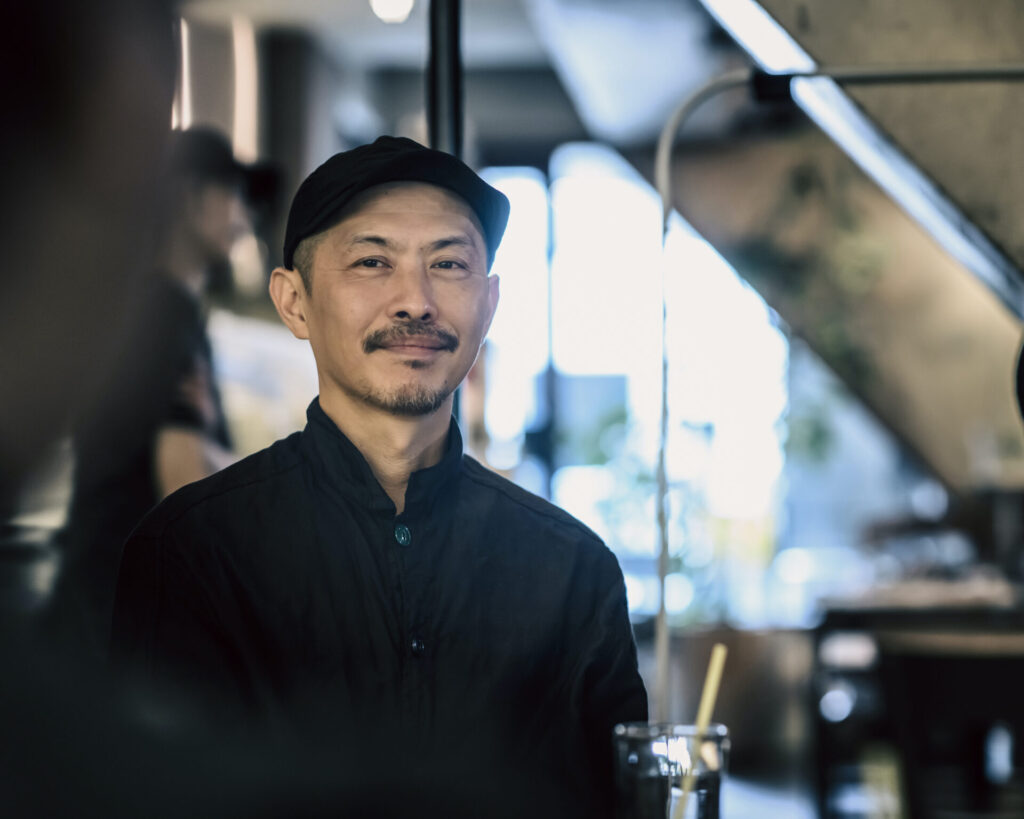
Note:
orientalia
The first work of Distiller M. It boasts an ensemble of scents and a long-lasting aftertaste. While it evokes the traditional Japanese taste of fragrant wood and ink, the overall flavor is characterized by the Asian nuance of scorching heat and terra. The original bottle, which is specially made by a glass manufacturer located in downtown Tokyo, and the “orientalia” log on it are all handmade. The re-release is scheduled for May 2025.
https://distiller-m.com
Profile
-
Takeaki Miura
Born in 1974 in Tokyo. Representative Director of the FLYING CIRCUS Inc. and Organizer of the Gin Festival Tokyo. Since the ’90s, Miura has been involved in the production of restaurants, leading the Japanese cafe boom in the early 2000s. Including the company-operated TOKYO FAMILY RESTAURANT, he has established over 30 restaurants and commercial facilities, mainly in Tokyo. He also handles the planning and operations of various events. In 2001, under the concept of “Gin is Music,” he launched a gin brand exploring scent and sound, “Distiller M”. In July 2024, the distillery released its first original gin, “Orientalia”. He also collaborates with Fuka, a long-established namafu shop, to produce distilled beverages.
-
Masakazu Shigeta
After working as an engineer in the music industry, Shigeta began his career as a cosmetics developer in 2001. From 2004, he worked on various cosmetics brands in the healthcare business of Nitto Denka Kogyo Co., Ltd., a metal surface treatment company founded by his great-grandfather. In 2017, he founded “OSAJI,” a skincare lifestyle brand, and became its brand director. In 2021, as a new store of “OSAJI,” he produced “kako,” a specialized shop for home fragrances and perfume in Kuramae, Tokyo. In the following year, he opened a combined shop of “OSAJI,” “kako,” and a restaurant, “enso,” in Kamakura, Kanagawa. In 2023, utilizing the technical skill of Nitto Denka Kogyo, he launched a pottery brand, “HEGE,” and in October of the same year, he became CEO of OSAJI Inc. He also has published books on beauty and held cooking classes and events focusing on food, which is the origin of beauty. He released a collaborative album with F.I.B JOURNAL called “Gensho hyphenated” in November 2024 and has been expanding the range of activities.
Publications
Taberu Biyou (Eating for Beauty) (SHUFU TO SEIKATSU SHA, 2024)
42-Sai ni Nattara Yameru Biyou, Hajimeru Biyou (Beauty cares to quit and start when you turn 42) (Takarajimasha, 2022)
Information
TOKYO FAMILY RESTAURANT
Opened in 2006 in Higashi, Shibuya, this restaurant makes it the concept to “travel the world through food.” The space is filled with a foreign atmosphere and serves cuisine from more than 30 countries, craft gin, and beers. The restaurant is open five days a week from Monday to Friday, from lunchtime to 6 p.m. The place is also attached to a specialty bottle shop with Japan’s largest selection of gin and a gin distillery called “Distiller M”, which houses an original distiller still designed by Mr. Miura.
@tokyofamilyrestaurant
The Gin Festival Tokyo
The Asia’s largest gin festival started in 2018. With passionate gin manufacturers and importers gathered together, the festival aims to further develop the gin culture by conveying the charm of gin and fostering new connections through it. In 2024, the festival was held for the first time in five years after the break period of the COVID-19 pandemic, and it gathered a record-high 80 companies and 100 brands from all over the world. The next festival is scheduled for 2026.
@gin.festival_tokyo
-
Photographs:Eisuke Komatsubara
-
Text:Masahiro Kamijo
-
2025-04-24
Vol.16
President of the FLYING CIRCUS Inc. and Organizer of the Gin Festival Tokyo Takeaki Miura(part 1)
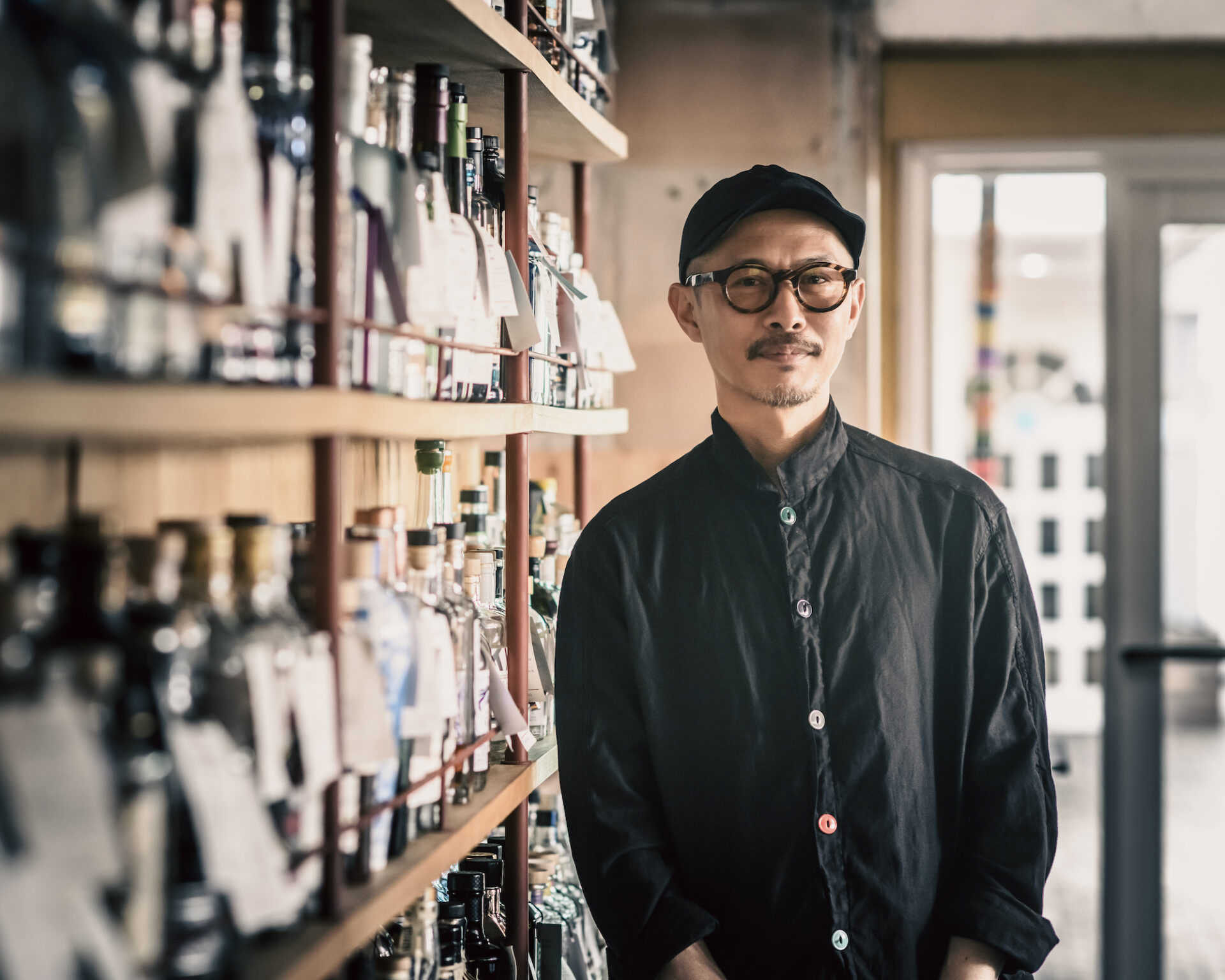
-
2024-09-26
Vol.10
Architect Shuzo Okabe(part 1)
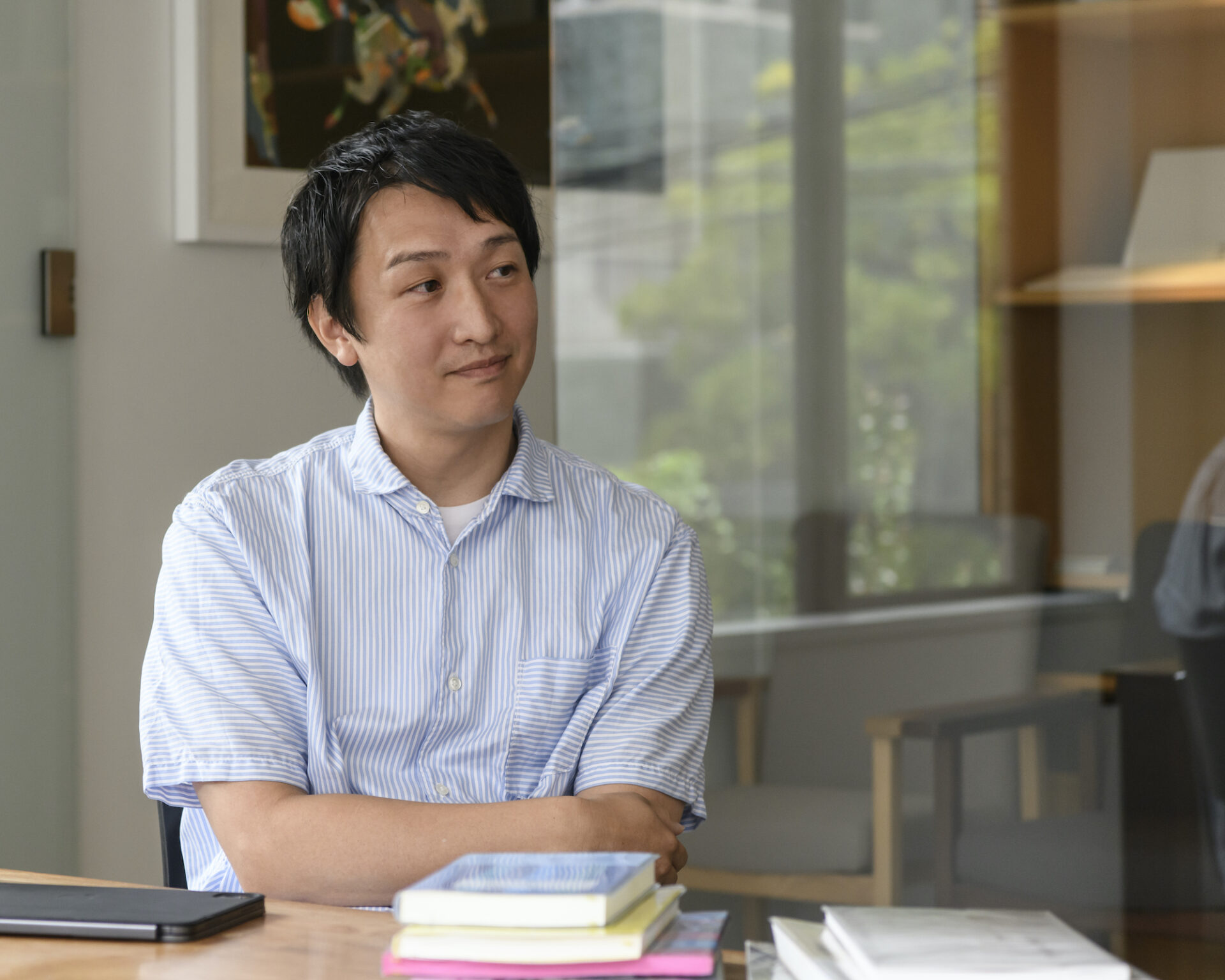
-
2025-02-27
Vol.14
Medical Doctor, Doctor of Medicine, Author, Project Professor of the Graduate School of System Design and Management (SDM) at Keio University Toshiro Inaba(part 1)
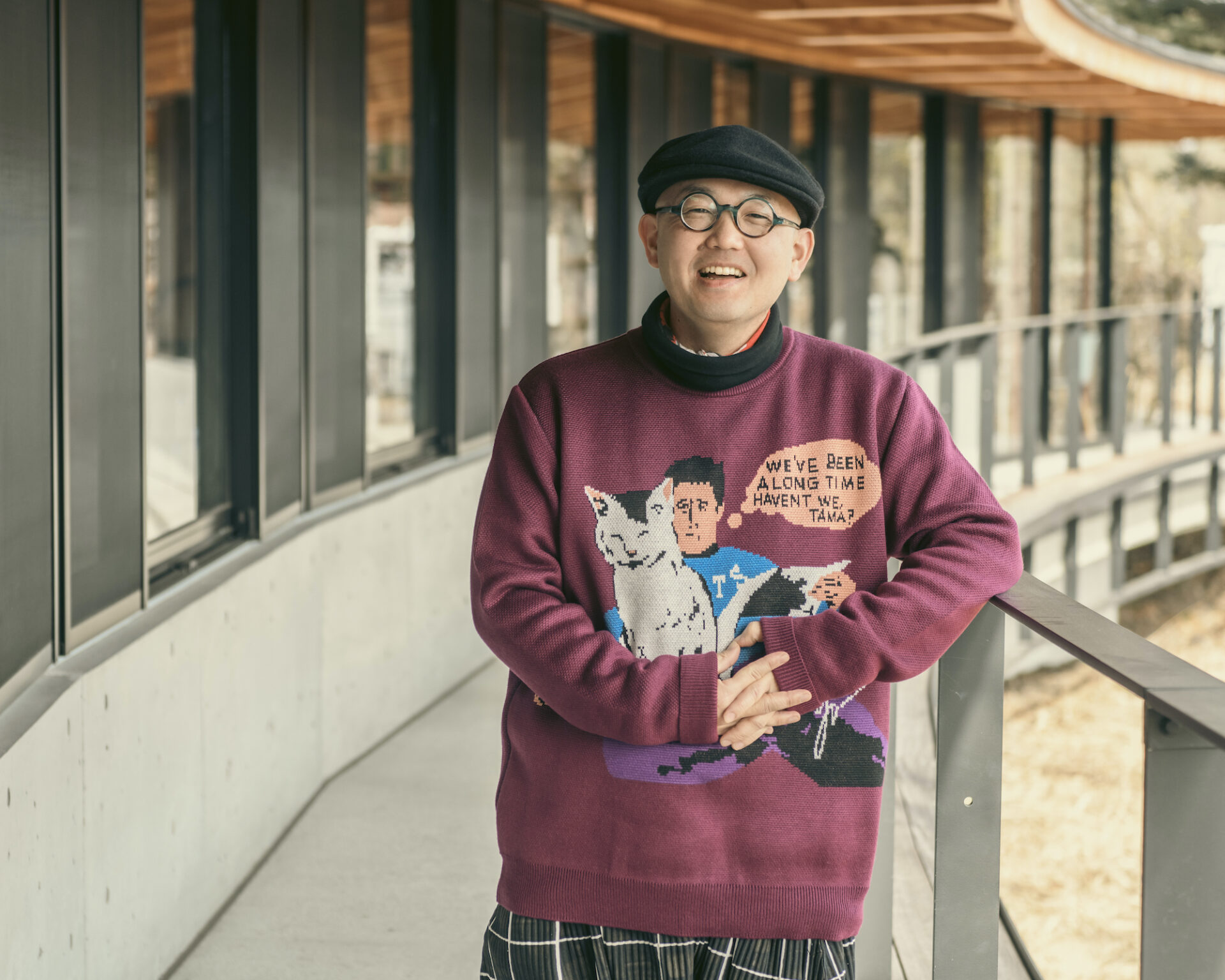
NEWS LETTER
理想論 最新記事の
更新情報をお届けします
ご登録はこちら
ご登録はこちら
メールアドレス
ご登録ありがとうございます。
ご登録確認メールをお送りいたします。